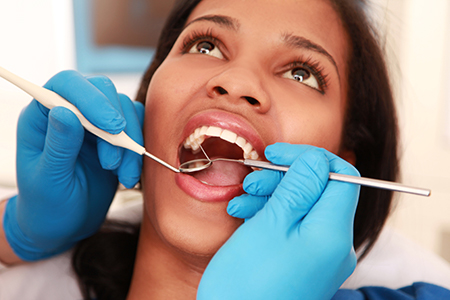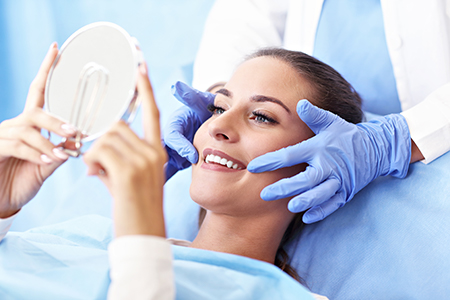Call Us Today!
(248) 863-9109
New Patients
(248) 221-2314

At Royal Dental Center, we take a preventive-first approach to oral health. Regular oral exams are the foundation for catching small problems before they grow, protecting both your smile and your overall well-being. Our team combines careful visual assessment with modern diagnostic tools to build a complete picture of your oral condition and tailor care to your needs.
Your initial comprehensive exam is more than a quick look — it's an opportunity for us to learn about you and for you to understand your current oral health. We begin by reviewing medical and dental history to identify any health conditions, medications, or lifestyle factors that could influence dental care. This context guides the exam and helps us spot risk factors that might otherwise be overlooked.
After the medical review, we perform a methodical clinical evaluation. That includes an inspection of the teeth, gums, tongue, soft tissues, and the supporting bone and joint structures. We assess your bite, check for signs of wear from grinding or clenching, and evaluate gum health to identify early periodontal concerns. When appropriate, we recommend diagnostic imaging to look beneath the surface.
We want our first visit to set a clear baseline you can rely on. Based on what we find, our team will explain any recommended next steps in plain language, outline preventive measures you can take at home, and schedule follow-ups if needed. The goal is practical guidance that fits your lifestyle and priorities.

Oral health is closely tied to general health. During a routine exam, we look for signs in the mouth that can reflect broader medical issues — for example, changes in gum tissue, persistent dry mouth, or unusual oral lesions. Detecting these early can prompt timely collaboration with your medical providers when appropriate.
Research increasingly shows links between chronic oral conditions and systemic diseases. Inflammation from untreated gum disease has been associated with a higher risk of complications in several body systems. While oral care alone is not a cure for systemic illnesses, responsible dental screening and management can be an important part of overall health maintenance.
Common conditions that can have oral manifestations include digestive and respiratory problems, cardiovascular concerns, diabetes, and neurologic conditions. If we identify unusual signs during an exam, we’ll explain their potential implications and recommend the most appropriate course of action, whether that’s closer dental monitoring or a referral to a medical specialist.
Routine exams are most effective when paired with professional cleanings. Even with excellent home care, plaque and tartar can accumulate in hard-to-reach places. Our hygienists use gentle, evidence-based techniques to remove buildup, polish the teeth, and reduce bacterial load — steps that lower your risk for cavities and gum disease.
Regular checkups also give us a chance to reinforce preventive habits and teach practical at-home techniques. Small adjustments in brushing, flossing, or dietary choices often produce measurable improvements. For children and adolescents, these visits also provide an opportunity to monitor growth and development and to discuss whether orthodontic evaluation might be helpful in the future.
We typically recommend ongoing preventive visits at intervals that suit each individual's needs. For many patients, twice-yearly visits strike a good balance between effective monitoring and convenience. We’ll work with you to determine a plan that fits your oral health status and long-term goals.
Even patients with healthy mouths benefit from consistent surveillance — early detection keeps treatment simpler and outcomes more predictable. Our care emphasizes practical prevention so you can enjoy a comfortable, functional, and attractive smile over the long term.
Many conditions that affect the teeth and jaw bone are hidden from plain sight. Dental x-rays let us see the deeper structures: the roots of teeth, the level of bone support, developing teeth, and areas of decay or infection that haven't yet caused symptoms. This diagnostic perspective is essential for thorough, responsible care.
Today's digital radiography provides clearer images with far less radiation than older film techniques. Images display immediately on a screen, which helps us explain findings to you in real time and include radiographs in your digital record for easy retrieval over time. Faster acquisition and lower exposure improve both safety and convenience.
Digital imaging also supports collaboration when more detailed planning is needed. Images can be securely shared with specialists or other healthcare providers to coordinate care. And because these images are stored electronically, we can compare them from visit to visit to track changes or treatment progress.
Quicker acquisition with reduced radiation exposure
Immediate viewing to discuss findings during your visit
Easy, secure sharing with other providers involved in your care
No chemical processing and lower environmental impact
Images are stored in the patient file for long-term comparison and planning

Not all x-rays serve the same purpose. We select the type of image based on what we need to evaluate. For example, small intraoral films focus on individual teeth, while panoramic images capture the entire dental arches and jaw in a single view. Each modality contributes unique information to diagnosis and treatment planning.
Here are commonly used imaging types and how they help:
Periapical x-ray - Focuses on a single tooth from crown to root and the adjacent bone, useful for identifying root problems and localized infections.
Bitewing x-ray - Shows the crowns of the back teeth to detect early decay between teeth and monitor bone height near the gumline.
Full Mouth Series - A collection of intraoral images that provides a comprehensive view of each tooth and surrounding bone when a detailed baseline is needed.
Panoramic Film (panorex) - Offers a broad two-dimensional overview of the upper and lower jaws, useful for assessing wisdom teeth, jaw joint concerns, and overall development.
Cephalometric Film - Provides a side profile view of facial bones and teeth, often used to evaluate growth patterns and orthodontic planning.
For complex cases or surgical planning, three-dimensional imaging with cone-beam computed tomography (CBCT) can provide invaluable detail. CBCT scans produce volumetric images that help with implant placement, airway evaluation, and assessment of complex anatomy when precise measurements are required.

Routine oral exams are the best investment you can make in the long-term health of your smile. By combining experienced clinical assessment with modern imaging and patient-centered education, we focus on prevention, early detection, and clear communication about next steps.
If you have questions about what to expect at an oral exam or would like more information about our preventive services, please contact us for more information. We’re here to help you maintain a healthy, confident smile.
Yes. We always welcome new patients and their families for care. Feel free to give us a call or reach out to us online to schedule a first visit or for any additional information on our office. We look forward to hearing from you!
Routine dental checkups and professional cleanings help ensure your smile remains in tip-top condition and that any developing problems receive the prompt care they require. While it's a good idea to schedule a checkup and cleaning twice a year, longer or shorter intervals between routine visits depend on your specific needs.
We understand that life gets complicated and busy, and for various reasons, you haven't been able to get to the dentist for care. Don't worry; it's always a good time to get back in touch with the health of your smile.
At Royal Dental Center, we offer skilled and compassionate care to address a wide range of dental needs. Whether you need a simple checkup and cleaning, restorations, periodontal treatment, root canal therapy, or the replacement of missing teeth to get your smile back into shape, we provide precise, gentle, stress-free treatment to give you a smile that is as beautiful as it is healthy.
Give us a call today; we're happy to address all your questions and concerns about getting your smile back in tip-top condition.
For pregnant women, practicing good oral care and seeing the dentist to maintain a healthy smile is considered an important component of prenatal care. Researchers have found that pregnancy not only increases the risk of oral health problems, but these problems may also lead to pregnancy complications. At the office of Royal Dental Center, we provide the skilled and compassionate care required to help expectant mothers keep their teeth and gums in tip-top condition. While certain procedures are not recommended during pregnancy, we provide the necessary care and take all the necessary precautions required.
Thanks to advances in modern dentistry, teeth that have been affected by a range of imperfections or that have sustained damage from trauma or dental decay can be restored to produce a naturally beautiful looking and functional smile.
As skilled and experienced providers of care, our office can effectively improve and enhance the appearance of teeth that are stained, discolored, misshapen, chipped, fractured, gapped, crowded, or broken down due to dental decay. At the office of Royal Dental Center, we offer a comprehensive selection of the leading-edge cosmetic solutions from teeth whitening procedures, dental bonding, tooth-colored fillings, and veneers, to prosthetic solutions and dental implants to rebuild complete and beautiful smiles.
Contact our office to learn more about the many ways we can help you create the smile you've always wanted.
If you're visiting Royal Dental Center for the first time, it is helpful that you contact your former dental office and have your records sent over to us. Make note of any problems you may have so that you can discuss them with your dentist.
To provide efficient service, we ask you to please bring your insurance card, an ID, plus any referral slips or diagnostic records given to you by another office. If you are taking medications, please note or make a list of what they are as you will need to provide that information.
Yes! We assure you that both you and your family will be in good hands at the office of Royal Dental Center.
We do our best to make sure every patient who steps into our office for care is put at ease. We provide precise and gentle care and our skilled, compassionate team strives to make every visit stress-free. You can rest assured that your smile is in the best of hands and that we are doing all we can to ensure your comfort throughout every procedure. While we always take the time to explain every step in care, feel free to ask us any questions about local anesthesia and methods of dental sedation.
At the office of Royal Dental Center, we strive to provide the highest quality of care to address all your dental needs. Once we've had the opportunity to examine your smile, we can give you a clear picture of any dental issues that are present, along with a quote for what the cost of treatment will be. The cost of care all depends upon the extent and complexity of issues affecting the health or appearance of your smile and the types of procedures that are required. Our goal is to make dental care more affordable so that you can begin treatment without any additional stress or delay.
Keep in mind that with routine dental checkups and periodic care, we can help prevent dental disease while treating emerging problems early in their onset to avoid larger issues and more expensive care down the road.
Routine dental checkups and preventive care procedures may be covered under your dental insurance plan requiring little to no out-of-pocket expense. We invite you to check our financial information page or give us a call to find out if our office participates with your plan, and if you have any other questions about dental insurance, dental savings plans, forms of payment, or financing options. We welcome your inquiries and do our best to help you begin care without additional stress or delay.
If you've lost a tooth due to injury, decay, gum disease, or any other reason, we recommend dental implants to replace missing teeth. Dental implants come the closest to replicating the look, feel, and function of your natural teeth.
Absolutely! Both flossing and brushing regularly are equally important to maintain your oral health. While brushing cleans the surface of your teeth, flossing cleans in between them. Flossing is important to prevent plaque buildup, which can cause gums to recede and lead to periodontal disease.
Even if you have dentures, it is still necessary to see a dentist! Dental checkups help ensure that your dentures are comfortable, fitting properly, and that there are no other problems. Beyond assessing your dentures, our dentist will also perform a thorough examination of the jawbone, and surrounding soft tissues both inside the mouth, the face, and neck, to confirm that you remain in good oral health.
Emergency dental care is a service we hope you'll never need- but if you do, the office of Royal Dental Center is here for you!
Whether you're suffering from a chipped tooth, toothache, or any problem affecting your oral health, you can be sure to get the prompt attention and compassionate care you require at our office. Patient care and comfort are our top priorities, and we offer a comprehensive range of the most advanced services to address a broad spectrum of dental needs.
While the pain of a toothache is one of the more common reasons that patients come to our office for emergency dental care, we also promptly treat emergencies that are not necessarily painful like crowns that have been dislodged and broken dentures that leave embarrassing gaps in one's smile.
You can rest assured that your oral health is in the best of hands at our office. We'll quickly determine exactly what's wrong, explain your treatment options, and then provide the precise and gentle care you require to alleviate your discomfort and get you back on the path to oral health and wellness.
Your health and comfort are our top priorities. If your dental emergency is painful, if it affects the appearance of your smile, or if you suspect that an infection is present, our office will make every effort to see you as soon as possible for care.
At the office of Royal Dental Center, we welcome patients of all ages for care and offer a comprehensive range of services designed to help every member of your family maintain a beautiful and healthy smile. Whether you or a loved one needs a routine checkup and cleaning, fillings, same-day crowns, a cosmetic smile makeover, the replacement of missing teeth or require the services of a skilled and compassionate emergency dentist, you can rely on our office for the highest quality care.
For more information on our office and the many services we provide, or to schedule an appointment for care, give us a call today.
A comprehensive oral exam begins with a review of your medical and dental history and a discussion of any concerns or symptoms you may have. The clinical portion includes a careful inspection of the teeth, gums, soft tissues, tongue, and the surrounding structures of the head and neck, as well as an assessment of bite and TMJ (temporomandibular joint) function. Your clinician will also perform a periodontal evaluation and an oral cancer screening to check for signs that require further attention.
Diagnostic imaging is often part of a complete exam and may include digital x-rays or, when indicated, three-dimensional CBCT scans to view deeper structures. Based on findings from the clinical exam and images, your provider will explain recommended next steps, prioritize care needs, and review at-home hygiene practices. The visit typically concludes with personalized prevention guidance and a schedule for follow-up care or routine monitoring.
For most patients, routine oral exams and professional cleanings are recommended every six months to maintain oral health and detect issues early. This interval allows your dental team to remove plaque and tartar that cannot be fully addressed with home care alone and to monitor any developing conditions when they are easiest to treat. Your clinician may recommend a different schedule based on individual risk factors such as gum disease, medical conditions, or a history of frequent decay.
Patients with specific needs — for example, those undergoing active periodontal therapy, complex restorative work, or certain medical treatments — may require more frequent visits for evaluation and maintenance. Regular appointments also provide opportunities for updated education on brushing, flossing, and other preventive measures tailored to your situation. Consistent professional care helps preserve both function and aesthetics over the long term.
Your first checkup establishes a baseline for your oral health and gives the dental team important context about your medical history, medications, and any dental concerns. The visit typically includes a thorough clinical exam, periodontal screening, an oral cancer check, and any necessary diagnostic images to assess tooth and bone health. Your practitioner will also evaluate your bite, look for signs of clenching or grinding, and note any soft tissue abnormalities that may warrant further investigation.
After completing the exam and reviewing x-rays, the dentist or hygienist will discuss their findings and outline recommended care options, focusing on prevention and your personal priorities. This is also a good time to ask questions about at-home care, dietary habits, and any symptoms such as sensitivity or soreness. The team will work with you to create a practical plan for maintaining or improving your oral health.
Dental x-rays and digital imaging reveal structures that cannot be seen during a visual exam, such as the roots of teeth, bone levels, impacted teeth, and decay between teeth. Digital radiography provides high-quality images almost instantly with lower radiation exposure than traditional film, and these images can be stored and reviewed alongside your electronic health record. In many cases, three-dimensional cone-beam computed tomography (CBCT) is used for advanced diagnostic needs, surgical planning, or implant placement.
Imaging helps clinicians make more accurate diagnoses and tailor treatment plans to your specific anatomy and needs. Images also serve as a communication tool, allowing dentists to show findings to patients and explain recommended options. Because imaging is chosen based on clinical necessity, your provider will discuss the purpose and benefits of any recommended radiographs before taking them.
An oral cancer screening is a routine component of a comprehensive exam because early detection significantly improves treatment outcomes and survival rates. The clinician inspects the lips, tongue, floor of the mouth, cheeks, and throat for suspicious lesions, color changes, or persistent sores that do not heal. The screening is quick, noninvasive, and performed at every checkup so that any concerning changes can be tracked over time.
If the dentist observes an abnormal area, they may document it, take diagnostic images, or recommend further evaluation such as a biopsy or referral to a specialist. Patients who use tobacco, consume alcohol heavily, have a history of oral cancer, or experience persistent mouth sores should remain especially vigilant and attend regular screenings. Timely follow-up of any findings is essential to ensuring the best possible outcome.
Oral exams play an important role in identifying signs of systemic conditions because many health issues manifest in the mouth before they appear elsewhere. Conditions such as diabetes, cardiovascular disease, and certain autoimmune disorders can produce oral symptoms like gum inflammation, dry mouth, or oral lesions that are visible during a routine exam. By documenting these signs, dental clinicians can help coordinate care with medical providers when appropriate.
Maintaining good oral health can also reduce the risk of complications related to systemic disease, particularly for patients with conditions that affect healing or immune response. During your exam, the dental team may discuss how medications, diet, and medical conditions impact oral tissues and suggest preventive strategies to protect both oral and overall health. Regular communication between dental and medical professionals supports comprehensive care and early intervention when necessary.
You should schedule an exam promptly if you experience persistent tooth pain, bleeding gums, a new or rapidly changing oral lesion, swelling, or difficulty swallowing or speaking. These symptoms can indicate active infection, advancing gum disease, oral cancer, or other conditions that need timely evaluation. Early assessment helps prevent progression and allows the team to address problems before they become more complex.
Other signs that merit an earlier appointment include loose teeth, chronic bad breath that does not respond to improved hygiene, unexplained jaw pain or clicking, and ongoing sensitivity to hot or cold. If you have a medical condition that affects oral health or are starting a medical therapy that impacts the mouth, notify the practice so exams can be scheduled as recommended. Prompt attention to changes in your oral health is an important step in preserving long-term function and comfort.
The dental hygienist performs essential preventive care during an oral exam appointment, including professional cleaning to remove plaque and tartar that cannot be removed by brushing and flossing alone. Hygienists also conduct periodontal assessments, record gum measurements, polish teeth, and apply preventive treatments as indicated. Their evaluation provides valuable data that the dentist uses to diagnose and plan any necessary care.
In addition to clinical procedures, hygienists spend time educating patients on effective at-home oral hygiene techniques, recommending appropriate tools such as floss, interdental brushes, or electric toothbrushes, and advising on diet and habits that influence oral health. They often serve as a patient’s first point of contact for questions and help coordinate routine maintenance to support long-term oral wellness. Regular hygienist visits are a cornerstone of preventive dentistry.
Oral exams are tailored to the patient’s age and developmental stage, so pediatric exams emphasize monitoring growth, eruption patterns, and the early detection of habits that may affect development. For children, clinicians assess tooth eruption, bite alignment, and risk factors for decay while providing age-appropriate guidance on brushing, fluoride use, and diet. Early visits also create opportunities to identify the need for future orthodontic evaluation and establish a routine of preventive care.
Adult exams focus on maintaining existing restorations, monitoring for periodontal disease, screening for oral cancer, and addressing functional concerns such as TMJ disorders or tooth wear. Both child and adult exams use similar clinical and imaging tools adjusted to the patient’s needs, and both prioritize prevention, education, and timely treatment. Regular, age-appropriate exams help set the stage for a lifetime of better oral health.
Before your exam, bring a list of current medications, recent medical history updates, and any records from other dental providers if available, especially if you are a new patient to the practice. Arriving with questions or concerns written down helps ensure you cover everything during the visit and that the team understands your priorities. If you have dental insurance, bring your card and any necessary referral information, though questions about benefits should be handled separately from clinical care discussions.
On the day of the exam, maintain your normal home care routine, and report any symptoms such as pain, bleeding, or sensitivity to the staff upon arrival. If you have special needs, anxiety, or mobility concerns, notify the office in advance so accommodations can be arranged. Patients in West Bloomfield, MI can expect thorough, evidence-based care delivered with attention to comfort and clear communication from the team at Royal Dental Center.
Take the first step toward exceptional dental care! Schedule your appointment with Royal Dental Center today and experience personalized treatment, advanced technology, and a caring team dedicated to your comfort and oral health. Don’t wait—your best smile starts now.
